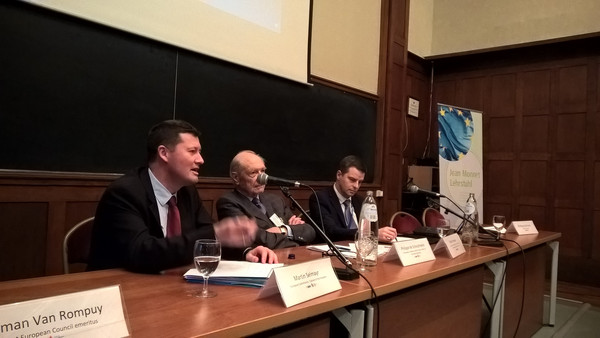
Session: Keynote speeches introducing to Working Group A & B
Speakers: Dr Martin Selmayr/ Didier Seeuws
Rapporteur: Marieke Eckhardt
The first working groups were introduced by keynote speeches by Dr. Martin Selmayr and Didier Seeuws. Dr. Selmayr is an expert in EU law, politics, finance and communications and Head of Cabinet of Jean Claude Juncker, President of the European Commission. Didier Seeuws is Director for Transport, Telecom and Energy of the Council and former Head of Cabinet of the previous President of the European Council, Herman Van Rompuy.
Dr. Selmayr started by addressing the interpretation that the European Council was the winner of the Lisbon treaty, which he did not want to contest but put into perspective.
For this aim, he emphasized the importance of circumstances and persons when analyzing the role of institutions. In the context of the Lisbon treaty, the circumstance of the crisis was a key factor in making the European Council an institutional winner, as it was the only institution that could act in the crisis. Similarly, the personality of Herman van Rompuy as successful broker contributed to the European Council’s role.
The importance of circumstances and persons could also be exemplified with other examples. Dr. Selmayr emphasized the role of Jean Claude Juncker sitting at the European Council’s conference table as President of the European Commission. As such, Juncker would actually get the opportunity to speak a lot during the meetings. In contrast, Martin Schulz would probably not have been as accepted as he is no former member of the European Council. Moreover, representatives from the Benelux countries would generally be accepted by the Heads of State or Government.
According to Selmayr’s observations, the factor of persons would currently also have an impact as the cooperation between the President of the Commission and the President of the European Council would work very well. Both presidents would moreover have the advantage of not being the first person in office. They would think about solving problems and not about institutions or the protocol.
All in all the European Council would currently be more important than ever before, due to the double-crisis-situation since 2015. As regards the European Council’s problem solving capability he drew an analogy to the Euro crisis: Compared to the procedure of tackling the euro crisis the European Council would now be in a situation similar to April 2010 where it still needed to sort out options to collectively solve problems. However, he again emphasized the role of the European Council by stating that if the European Council would not have existed so far, it would need to be invented in the context of the crisis.
Didier Seeuws gave insights into his observations on the work of the European Council. He started by discussing the European Council’s decision-making activities, where the decision-making mode would be the Union method. In this context, he firstly emphasized the legitimacy of the body as a nationally elected representative would not have less legitimacy than an elected Member of the European Parliament. As example for the important role of the European Council he named the decisions on the EFSM and the climate and energy framework. These decisions could not have been decided by any other body, as the topics were too closely related to national interests. Although not legally binding, the European Council Conclusions could be seen as a bible and guideline for legislation processes. However, the relationships between the European Council and the member state institutions would have to be seen as a bilateral one.
As regards the importance of the Lisbon treaty for the European Council, he said that this had a considerably smaller impact than the enlargement and the euro crisis, as these two affected the club doctrine. He also reflected about the effectiveness of European Council action which would depend on the political will of members to agree.
Moreover consensus formation would require leadership. A permanent representative would therefore be an authority which would not be easy in a club of bosses. Van Rompuy would have achieved this leadership through a close contact with capitals. Here, also a close cooperation with opposing countries would be important in order to make them feel part of the decision. Finally, as regards leadership it would be important that it is concerned with the next generation and not the next election.
All in all the European Council could bring more Europe because its decisions would open ways into ‘broad waters’. An example would be the Banking Union that would not have been possible without the European Council. This would also show how crisis has so far led to more integration.
The subsequent discussion focused inter alia on whether a possible BREXIT would be part of the crisis. Martin Selmayr responded by stating that the BREXIT discussion would sort out certain problems. A solution however, would not mean disintegration but overcoming the problems. However he added that if the British would not exist in the European Union they would need to be invented.


